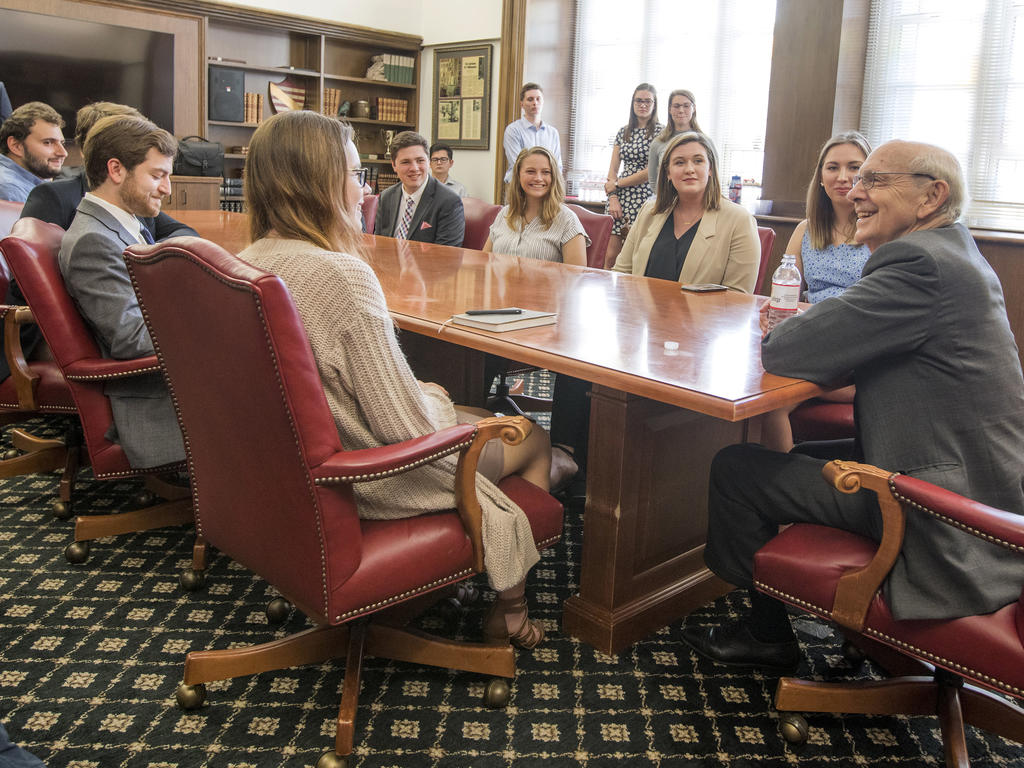Supreme Court Justice Stephen Breyer Visits Campus
by Caroline O'Connor '20
Standing at the podium in McNeill Concert Hall, U.S. Supreme Court Justice Stephen Breyer contemplated the increasingly global issues that fill his desk in Washington. When he began his time on the court nearly 25 years ago, he said, justices simply did not need to reference foreign bodies when writing their opinions. He would have been hard-pressed then to even name a case that required knowledge of international law.
“I have no problem today,” Breyer said. “It’s really risen to 20-30 percent, sometimes more, where you have to know what’s going on beyond our shores in order to solve problems, statutes, and constitutional interpretations.” The world has grown smaller, and he encouraged listeners to embrace potential new connections.
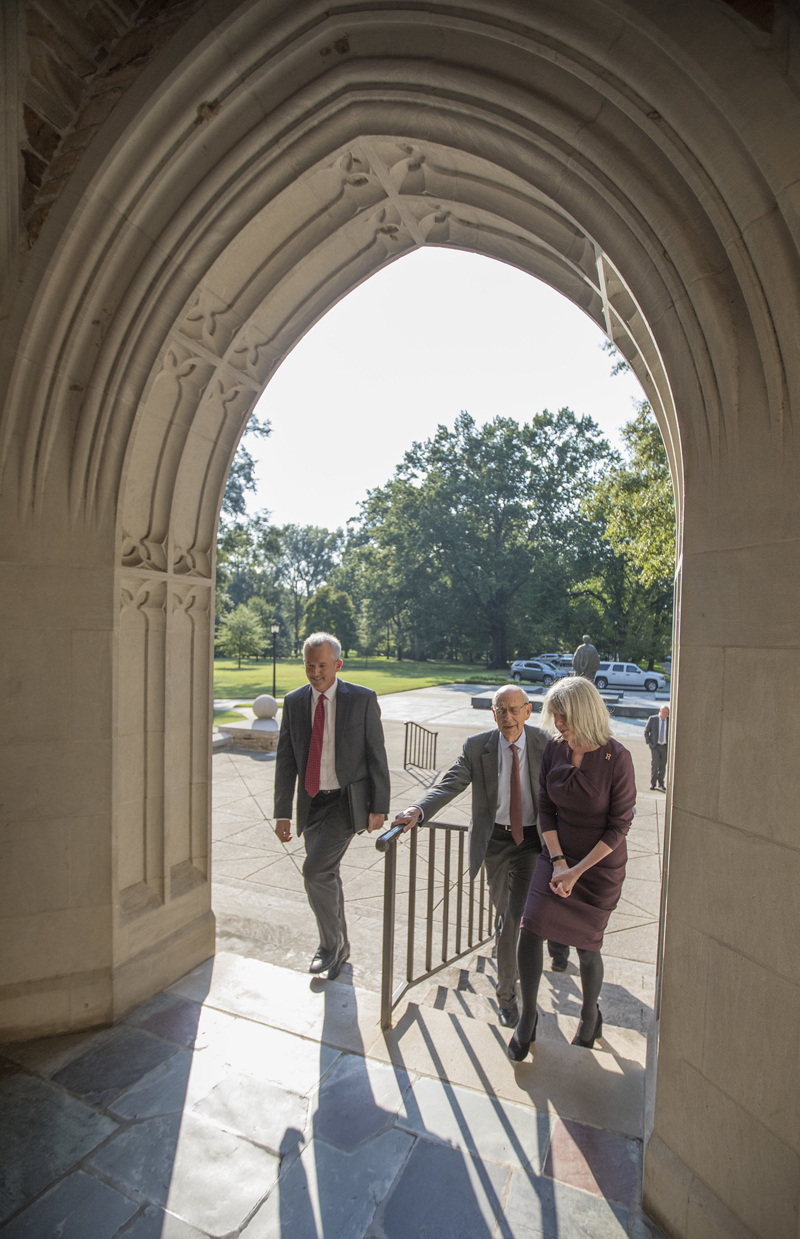
Breyer visited Rhodes on October 3 to deliver the school’s annual Constitution Day lecture. He began his lecture by welcoming the crowd of more than 500 and noted that the event had brought the city together. Rhodes students, faculty, and staff were joined by members of the Memphis community, including U.S. Congressman Steve Cohen and federal and state judges.
Appointed by President Bill Clinton in 1994, Breyer described growing globalization over the past two-and-a-half decades. His most recent book, The Court and the World: American Law and the New Global Realities, focuses on international issues affecting the Supreme Court, and he has traveled the country to encourage citizens to embrace the globalized world as an opportunity to learn from foreign governments.
He listed a handful of cases he has decided that dealt with international law and foreign bodies, including a 2013 copyright case where a college student from Thailand sold hundreds of textbooks that he had shipped for a reduced price at home. When the case reached the Supreme Court, the justices’ desks ended up filled with briefs from governments and organizations from around the world, with their decision having the potential to affect $2.3 trillion in commerce. International bodies and laws simply cannot be ignored, and he encouraged the crowd to participate and to see beyond boundaries.
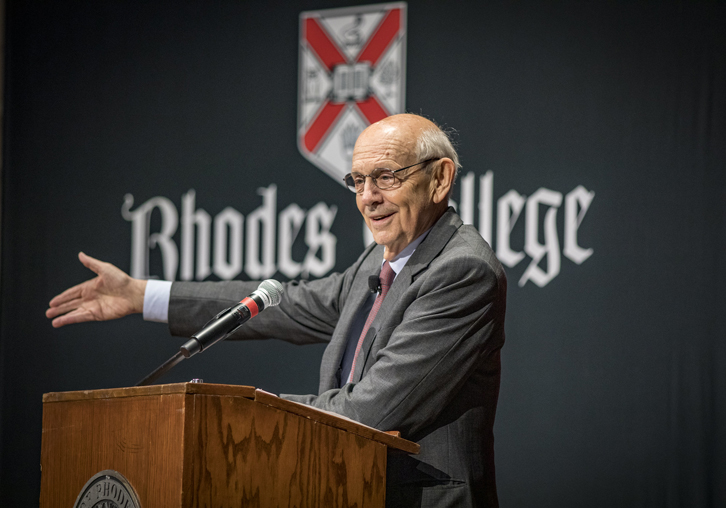
“The more you think, it isn’t good versus evil, it isn’t globalization versus localism or tribalism; it is that we are in a world where there is both,” Breyer said. The world is full of successful democracies, and Breyer argued that the U.S. could benefit from observing what these governments are doing well.
Sara Weeks ’20 said that Breyer’s focus on international issues in the Supreme Court applied directly to the coursework in her bridge major. “In my political science classes, I have learned more about how our government functions, and in my international studies classes, I learn about how foreign governments operate and interact with each other,” she said. “Justice Breyer speaking on how the judicial branch interacts with foreign judiciaries was a pleasant surprise for me as it was very pertinent to my field of study.”
Listeners got to hear about the day-to-day life of a Supreme Court justice, and learned that some perceptions are not necessarily reality. Justices focus on creating uniformity in the courts and, despite a polarized political climate, half of all Supreme Court cases are decided unanimously. He also described a life of studious reading and writing — not so different from a college student. “I read, and I do homework. And if you do your homework well, you will get a job where you can do homework the whole rest of your life,” Breyer said, which inspired laughs from the audience.
Students like Kristen Morris ’20 appreciated this behind-the-scenes look at a Supreme Court justice’s life, because it set a model for her future career path. “He spends a lot of time reading through cases and deciding which he believes would be good to bring to the Supreme Court,” she said. “Hearing that he is basically always on the job but doing what he loves is inspiring, and that’s what I aspire my life to be like.”
Professor Timothy Huebner, the Irma O. Sternberg Professor of History and Associate Provost, organized the event. A noted Constitutional scholar, he provided the opening remarks of the event and emphasized that the Constitution is the only document that all Americans hold in common. Constitution Day is technically September 17, in order to honor the exact day the document was signed, so Breyer’s lecture was an honorary celebration. Free copies of the Constitution were also offered to everyone in attendance.
“Any commemoration, even a late one, should be cause for both celebration and reflection,” Huebner said. “Make no mistake: The Constitution of the United States is worth celebrating.”
“Hearing that he is basically always on the job but doing what he loves is inspiring, and that’s what I aspire my life to be like.” --Kristen Morris '20
Professor Huebner pointed out the significance of hosting a Supreme Court justice on campus. “There are very few, if any, liberal arts colleges that have hosted two Supreme Court justices in the past four years like Rhodes has,” he explained. The other Supreme Court justice to visit was Antonin Scalia in 2015. Both events gave students and the greater Memphis community the opportunity to learn about the issues affecting the nation’s highest court, and the justices gave differing opinions on how they interpret the Constitution.
Students taking Huebner’s class on the history of the Constitution, as well as Professor Ali Masood’s class on judicial politics, were able to meet Breyer before his lecture. The group of 26 students discussed their coursework with him, and their studies particularly prepared them, as they had context for the court’s evolution.
“When we were reading opinions from Chief Justice Marshall and Chief Justice Taney, how are they using the same way of thinking that Breyer is articulating 200 years later? From the early 1800s, we can see the threads, we can see the connections and how we got to here,” Huebner said, describing his own class that focused on Constitutional history until the year 1865.
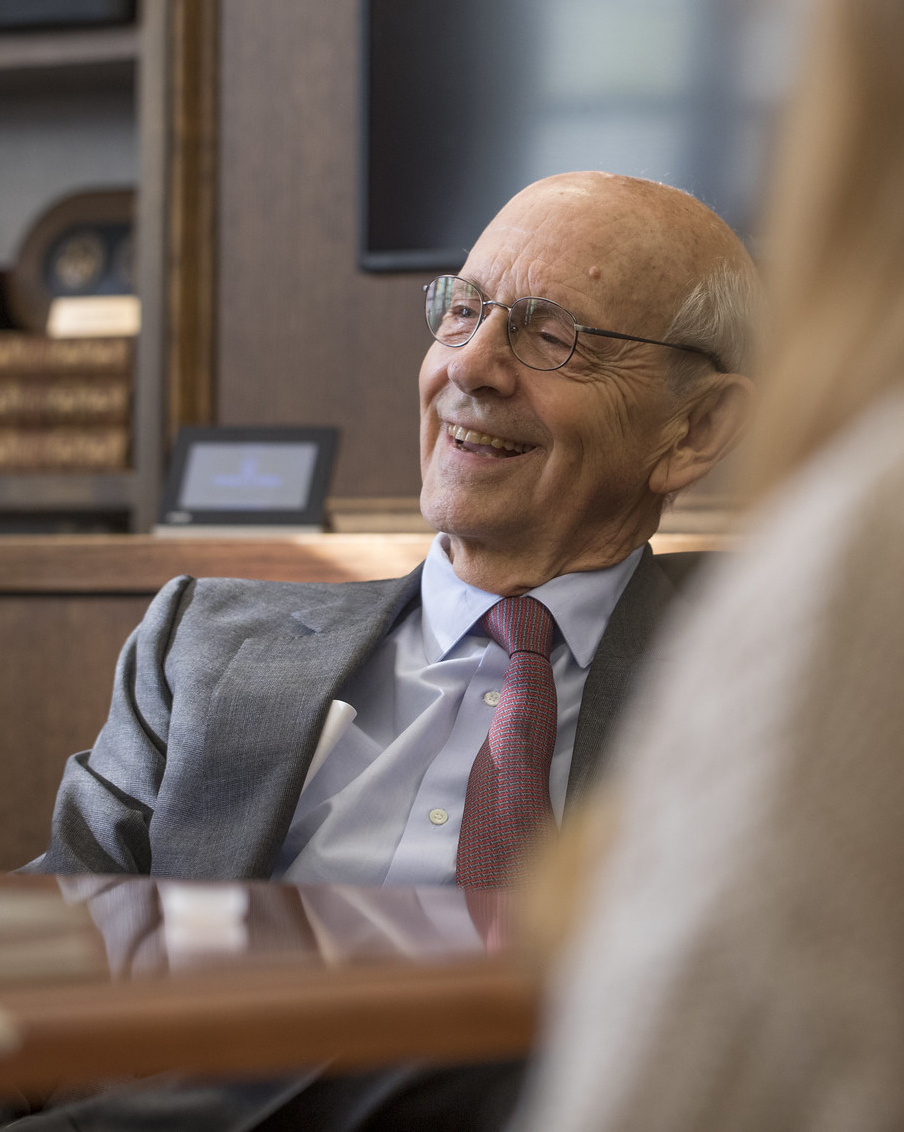
Following the lecture, President Marjorie Hass hosted a dinner for Breyer, and they were joined by members of the Memphis community, including Rhodes faculty and local politicians and judges. Four students also attended, and after the main course Hass invited them to share which Supreme Court case was the most meaningful to them. Sarah Eiland ’20 is currently enrolled in Huebner’s Constitutional History class, and she chose the case Obergerfell v. Hodges, the landmark 2015 decision that legalized same-sex marriage. Justice Breyer decided on the case, ruling with the majority in the 5-4 decision.
“I got to stand up and look in his eyes and thank him for his ruling in this case that has changed my life and has changed so many people close to me and all their lives. And talk about how that was the first time that our generation saw the impact that the Supreme Court can have on individual lives,” Eiland said. Breyer’s visit also came just days before the Court began proceedings on their newest round of cases, so these students were given the unique opportunity to meet with Breyer just before he returned to Washington to decide on potentially landmark new cases.
Eiland added, “Who gets to thank a Supreme Court justice for their opinion on a case that changed people’s lives? So that was one of the coolest things I’ve been able to do, and one of the most meaningful and most inspiring.”
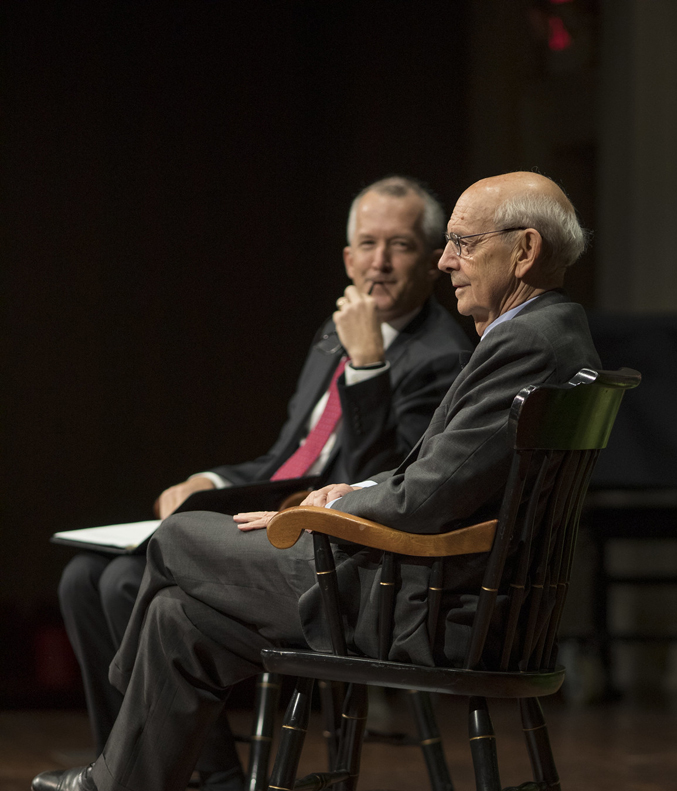
Breyer’s 90-minute lecture was followed by a Q & A with Huebner. Students, staff, and faculty submitted questions, and Breyer discussed the work that goes into his briefs and opinions and the importance of working together in an age of polarization.
Morris noted that Breyer’s discussion offered her an opportunity to learn how her studies applied to real-world situations, particularly studies that she has not been able to dedicate as much time to. “I haven’t had much outside-the-classroom learning experiences relating to my political science minor,” she said. “It was a welcome shift to hear about politics, federal government, and laws from a first-person perspective instead of strictly learning about politics in a classroom setting.”
Students in any discipline benefit from learning about the Constitution, and Breyer’s lecture gave everyone in attendance a chance to learn from the country’s founding document. “Our institutional mission has to do with engaging the public and serving the public good,” Huebner said, so the college made the event as accessible as possible, even live-streaming the lecture online.
When asked about the value of a liberal arts education, Breyer reflected on the skills a school like Rhodes offers. “Try learning a foreign language; try reading a few novels,” he said. “Why? One reason is because you only have one life. We know pretty well our own life. We know it pretty thoroughly. And we know our families, we have a few friends, and we know something about them. But there are billions of people in the world, and the best way to find out about lives that aren’t yours is by learning French, or learning Spanish, or learning Chinese, and you’ll see a different culture and you will be different and you’ll learn something about other people. And the same is true of literature. It’s the best way, I think, into the minds of others, and that means it’s the best way to produce that kind of understanding.”
Breyer gave the crowd at Rhodes a sweeping history of the Supreme Court, as well as a glimpse into how modern justices learn from governments beyond the United States. His lecture highlighted how the Constitution applies to every American, and the Supreme Court justice encouraged attendees to follow its principles by engaging with different perspectives and participating in public life.
